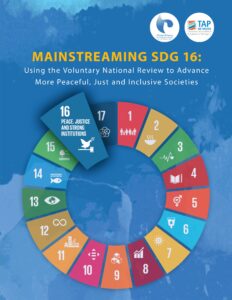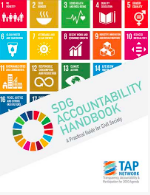International monitoring mechanisms play a key role in monitoring, reviewing and making recommendations on the implementation of human rights and labour standards that are essential to achieve peaceful, just and inclusive societies
The international human rights and labour standards monitoring systems can play an important role in ensuring accountability for SDG16+ commitments. International human rights monitoring is undertaken through several mechanisms including:
Similar to the human rights system, the International Labour Organization’s (ILO) supervisory system also monitors the implementation of ILO Conventions by State parties, many of which address SDG16+ issues (e.g. forced labour, child labour, and equal pay for work of equal value).4
Despite having distinct mandates, these mechanisms all play a key role in monitoring, reviewing and making recommendations on the implementation of human rights and/or labour standards that are essential to achieve peaceful, just and inclusive societies. More than 90%of the 169 SDG targets directly reflect elements of international human rights and labour standards,5 and there are over 36,000 recommendations from international human rights mechanisms linked to SDG 16 alone.6 Given this significant overlap, as well as the legally binding nature of international human rights and labour standards, international monitoring mechanisms can be a critical tool to advance SDG16+ accountability.
In reviewing the human rights or labour record of countries, international monitoring mechanisms can be used to raise specific SDG16+ issues, resulting in recommendations that further SDG16+ implementation. The wealth of analysis, data, information and recommendations produced by these mechanisms can also be used to report on issues related to peace, justice and inclusion in SDG accountability processes, including VNRs.7 Furthermore, there is significant potential to align international human rights and labour standards monitoring mechanisms with SDG-related follow-up and review processes, given the strong links between human rights, labour standards and the SDGs. Aligning these mechanisms could help to promote policy coherence, facilitate the sharing of qualitative analysis and data, maximize efficiency and effectiveness, and reduce the overall reporting burden on countries,8 thereby strengthening accountability for SDG commitments including SDG16+.

There are a number of ways that you can use international human rights and labour standards mechanisms to support SDG16+ accountability, including the following:
1. Refer to country-specific recommendations from international human rights and labour standards monitoring bodies in engaging in SDG16+ advocacy with your government – While the SDGs are not legally binding, your government may be obligated to fulfill specific SDG16+ targets based on their ratification of human rights or ILO conventions.9 See the key resources in this section for guidance in identifying relevant recommendations.
TIP: 

TIP:
Confirm that your country has ratified an international convention or agreement and, if so, identify any reservations made in relation to your SDG16+ issue.
2. Engage with international human rights and labour standards mechanisms to advance your SDG16+ issue(s) – In particular, you should consider pursuing the following actions:
a. Determine which mechanism to engage with by analyzing the links between SDG16+ targets, human rights and labour standards, and your country’s ratification of relevant international agreements. See the key resources in this section for further guidance;
b. Familiarize yourself with the specific rules, modalities and timelines for civil society interaction with the monitoring body or process with which you wish to engage;
c. Participate in any consultations held by governments to prepare their national report on the human rights or labour standards situation in your country, as well as any consultations held under the Special Procedures of the Human Rights Council;
d. Prepare written submissions on the human rights or labour standards situation in your country in relation to your SDG16+ issue(s) for consideration by monitoring bodies. Many of these bodies accept written information, materials and reports from civil society;
TIP: Preparing written submissions to monitoring bodies on SDG16+ 

TIP: Preparing written submissions to monitoring bodies on SDG16+
e. Produce independent civil society shadow reports on the human rights or labour standards situation your country in relation to your SDG16+ issue(s);
f. Participate in review sessions as observers and/or through oral submissions at review sessions or pre-sessional working groups held by monitoring bodies; and
g. Follow-up on the outcomes of reviews by engaging in dialogue with your government to help them meet their joint human rights, labour standards and SDG16+ obligations.
3. Use information from international monitoring mechanisms in SDG follow-up and review processes – You can use information, recommendations and reports from international human rights and labour standards mechanisms to inform SDG follow-up and review processes such as VNRs.11 This information can be used in preparing civil society shadow reports, written or oral statements, and policy or advocacy briefings on SDG16+ implementation for a range of stakeholders including government actors.
4. Encourage collaboration between National Mechanisms for Reporting and Follow-up (NMRF) and national SDG coordination bodies responsible for SDG follow-up and review – A NMRF is a government coordination body or structure that is mandated to coordinate and prepare reports for and engage with international and regional human rights mechanisms.12 Aligning the work of these bodies with the national bodies responsible for SDG reporting – including for SDG16+ – is essential to increase coherence between human rights, labour standards and sustainable development monitoring processes.13
Mainstreaming SDG 16: Using the Voluntary National Review to Advance More Peaceful, Just and Inclusive societies (Global Alliance and TAP Network, 2020)
This resource provides policy guidance, case studies and good practices on advancing SDG 16 implementation at national and subnational levels by more effectively leveraging the Voluntary National Review (VNR) and post-VNR processes. It contains a chapter on ‘Aligning VNRs with other Reporting and Review Mechanisms.’
Available at: https://www.sdg16hub.org/topic/mainstreaming-sdg-16-using-voluntary-national-review-advance-more-peaceful-just-and-inclusive

SDG Accountability Handbook: A Practical Guide for Civil Society (TAP Network, 2018)
This handbook provides guidance on the different approaches and steps that can be taken by civil society to ensure national government accountability for the SDGs. It includes a chapter on ‘Utilizing International Human Rights Mechanisms.’
Available at: https://sdgaccountability.org/

This section of OHCHR’s website provides information and documentation on the different human rights monitoring mechanisms in the UN system including the treaty-based bodies and charter-based bodies.
Available at: https://www.ohchr.org/EN/HRBodies/Pages/HumanRightsBodies.aspx
This online database allows users to search the observations and recommendations of the UN treaty bodies, Special Procedures and the Universal Periodic Review (UPR), by country, region, mechanism, human rights theme, concerned persons/groups and SDG target. Available in the six official UN languages.
Available at: http://uhri.ohchr.org/en
This online database allows users to search all public documents adopted or received by the UN human rights treaty bodies. It is searchable by state/entity or geographic region, committee, document type and symbol/dates.
Available at: https://tbinternet.ohchr.org/_layouts/15/TreatyBodyExternal/TBSearch.aspx
This website provides detailed information on the UPR including cycles, sessions, documentation by country and civil society engagement.
Available at: https://www.ohchr.org/en/hrbodies/upr/pages/uprmain.aspx
The ILO’s information system on International Labour Standards, which brings together information on International Labour Standards (such as ratification information, reporting requirements, and comments of the ILO’s supervisory bodies) as well as national labour and social security laws.
Available at: www.ilo.org/dyn/normlex/en/
This online database allows users to identify the links between the SDGs or SDG targets and international and regional human rights instruments, labour standards and key environmental instruments (some of which have human rights dimensions). Available in seven languages.
Available at: http://sdg.humanrights.dk
This online database links recommendations and observations issued by international human rights monitoring mechanisms with the Goals and targets of the 2030 Agenda. Users can search for data by country, human rights mechanism, SDG or SDG target, and specific rights-holder groups. Available in the six official UN languages.
Available at: https://sdgdata.humanrights.dk/en/
This guidance note explores different ways in which human rights recommendations can be used in different processes and at different levels in order to pursue a human rights-based approach to sustainable development.
Available at: https://www.humanrights.dk/publications/integrated-review-reporting-sdgs-human-rights
This paper explains how human rights principles underpin the 2030 Agenda, why a human rights-based approach is necessary in its implementation, and how global and national human rights mechanisms could be leveraged to strengthen SDG monitoring and review at the High-level Political Forum (HLPF).
Available at: https://www.daghammarskjold.se/wp-content/uploads/2020/03/hlpf_2_birgitte_saionara.pdf
This practical handbook – aimed at civil society actors – is a user-friendly and authoritative resource on the UN human rights bodies and mechanisms. It explains how these bodies and mechanisms work and explores the many important ways that civil society actors can engage with and contribute to their work. Available in Arabic, Chinese, English, French, Georgian, Nepali, Persian, Russian, Spanish and Vietnamese.
Available at: http://www.ohchr.org/civilsocietyhandbook/
Transparency, Accountability &
Participation (TAP) Network
Address: 205 E 42nd St.
New York, NY 10017
Email:
secretariat@tapnetwork2030.org